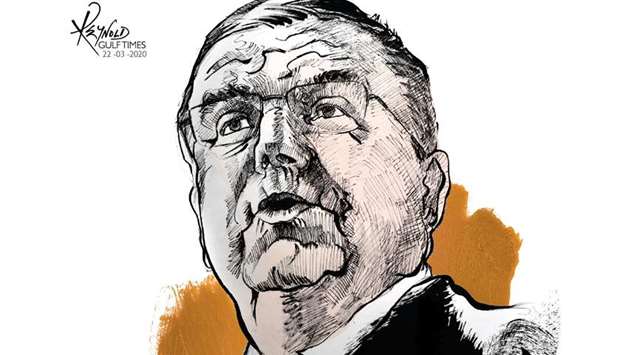Defying growing criticism, International Olympic Committee (IOC) president Thomas Bach yesterday defended pressing on with plans to stage this summer’s Tokyo Olympics despite the coronavirus outbreak, for the athletes’ sake.
“A cancellation would destroy the Olympic dream of 11,000 athletes from 206 national Olympic committees and the IOC refugee team. Such a cancellation would be the least fair solution,” Bach told German SWR radio.
Bach also said that because of their complexity “you can’t postpone the Olympic Games like a football match next Saturday,” and insisted that any decision required reliable and clear information.
But pressure on the IOC is growing from athletes and officials to postpone the Games scheduled for July 24-August 9.
The athletics chiefs from Britain, Nic Coward, and Germany, Juergen Kessing, were among the latest to urge a postponement.
“To leave it where it is is creating so much pressure in the system. It now has to be addressed,” Coward told the BBC.
Kessing told DPA “I would have wished they would follow the example of football and like the European championships also postpone the Olympic Games in Tokyo by one year,” Kessing told DPA.
Football’s UEFA decided on the Euro tournament on Tuesday.
Bach has insisted it was too early for a decision but he has also told the New York Times they are “considering different scenarios” but no outright cancellation.
On Friday, Olympic Committees from Norway and Slovenia, as well as the US swimming federation had also urged the Games to be postponed for health reasons and because many athletes can’t train because of government restrictions.
US swim chief Tim Hinchey, in an open letter on Friday to national Olympic committee CEO Sarah Hirshland, named a postponement “a solution that provides a concrete path forward and allows all athletes to prepare for a safe and successful Olympic Games in 2021”.
Athletics multi event world champions Katarina Johnson-Thompson of Britain and Niklas Kaul of Germany have meanwhile said their training is all but impossible, and Kaul questioned whether fair competition would be possible in Japan with some athletes able to train in less Covid-19 affected areas while those in areas with restrictions couldn’t.
Questions have also been raised around drug testing amid lockdowns, travel bans and other restrictions but the World Anti-Doping Agency said it new guidelines issued Friday it was trying its best to protect the clean athletes and be ready immediately when life returns to normal.
WADA president Witold Banka pledged they would be “providing leadership and support so that the health of all concerned can be protected and the integrity of the world anti-doping system can be maintained as much as possible.
“It will also be crucial that the system can return to full power as quickly as possible once the various restrictions are lifted.”

International Olympic Committee (IOC) president Thomas Bach
